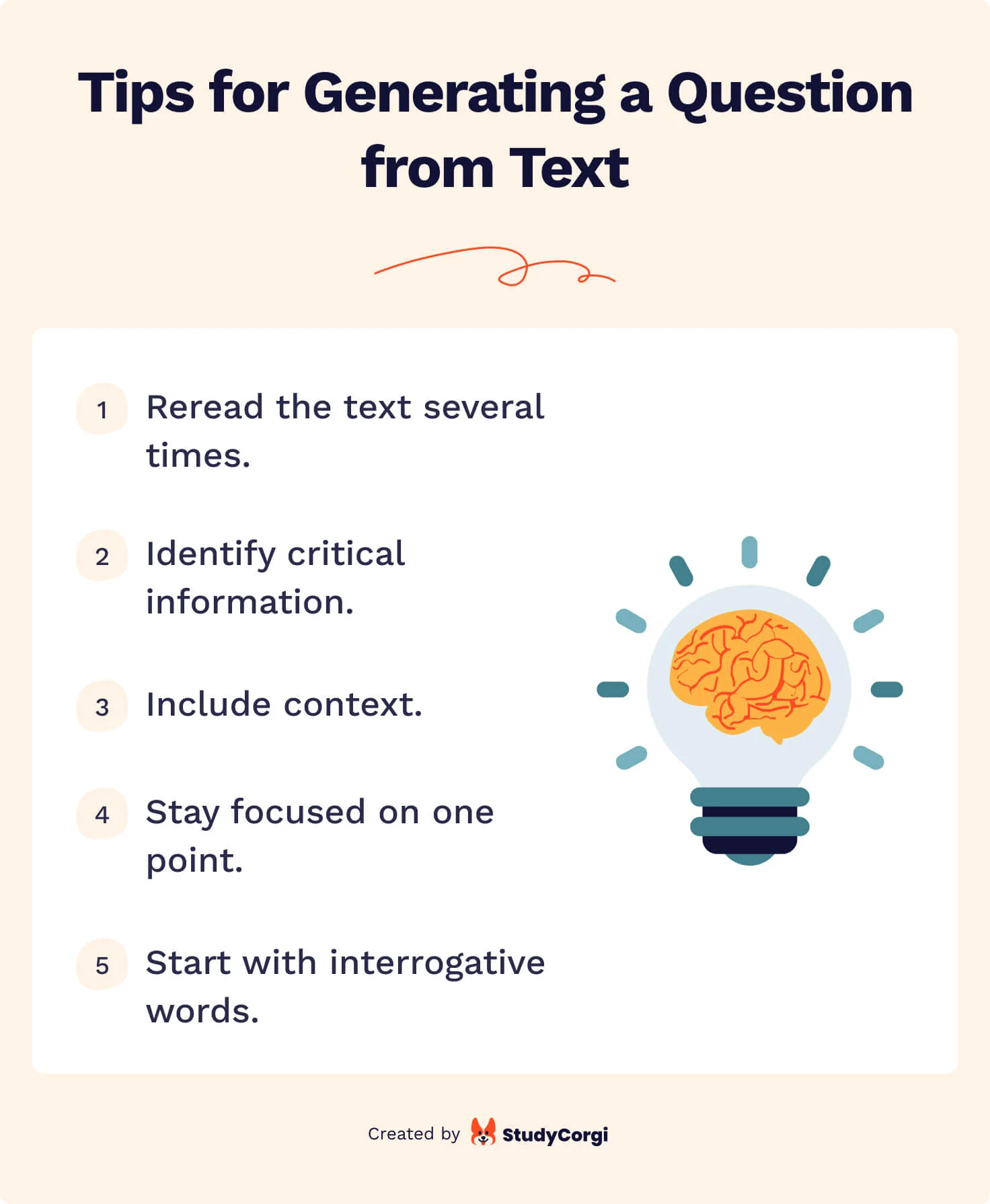📌 What Is Question Maker from Text?
Free question generator from text is an online tool that creates questions from a piece of writing. Paste the text into the app and click “Make questions.” The tool will automatically formulate various questions about the content.
Our question maker from text is AI-powered, so you’ll receive clear, relevant, and thought-provoking questions.
When to Use
You can benefit from our question AI generator in various scenarios. For instance, you may turn to it when:
- Composing an essay that needs a research question.
- Revising for exams or quizzes.
- Finding a topic for your thesis.
- Reviewing class notes or lectures.
- Trying to deepen your comprehension of a topic.
- Brainstorming ideas for discussion.
- Seeking inspiration for creative writing.
- Creating headings or subheadings for a text.
- Formulating questions to a text as a homework assignment.
- Exploring various perspectives on a specific issue.

⚙️ How to Generate a Question from Text?
Our AI question generator from text has a straightforward interface, enabling students to create clever questions in a few clicks. Here’s a small guide on using it:
- Copy the text and paste it into the tool.
- Select the number of questions (from 1 to 10) you wish to get.
- Click “Make questions” and await the results.
The question maker from text is free and unlimited, so you can craft as many interrogative sentences as needed.
While the tool is fantastic, you might want to master the art of crafting powerful questions yourself. Check out these valuable tips to get started:
- Carefully read the text. Before formulating questions, fully grasp the text.
- Identify critical information. Look for the text’s central ideas, essential details, and supporting evidence.
- Decide on the question type. Understand the goal of your questions and pick the suitable type: factual, inferential, evaluative, or interpretive.
- Start with interrogative words, such as who, what, when, where, why, and how. They will help frame questions and guide your thinking.
- Include context. Offer the relevant background from the text to ensure focused and precise questions.
- Use the text’s language. Incorporate the paper’s vocabulary into your questions to connect it seamlessly to the text.
- Maintain focus and relevance. Keep your questions pertinent to the topic at hand. Avoid tangential or unrelated queries.
- Check for clarity and coherence. Ensure your questions are well-written and easy to understand. Remove any ambiguities or misunderstandings that may arise from poor phrasing.
How Do I Turn a Sentence into a Question?
To turn a sentence into a question, consider its purpose. It will influence the choice of question words, such as who, what, when, where, why, or how. Identify the keywords in the sentence and integrate them into the question to make it relevant to the content. Make sure your question is straightforward and reflects the original meaning.
📝 Questions Generated from Text – Examples
Are you still deciding whether to try the question maker from text? Check out some examples of questions the tool generated based on three academic papers.
Patient-Centered Care, Quality, and Safe Practice
- How does a patient-centered approach to care impact the overall healthcare quality?
- How can healthcare professionals actively promote patient safety while maintaining high standards of quality care?
- How can healthcare entities foster a culture of patient-centered care, quality improvement, and safe practice?
Aging: The Impacts of a Growing Elderly Population
- What societal changes can help address the unique challenges of an aging population?
- How can governments and businesses adapt to support the shifting needs and contributions of elderly individuals?
- In what ways does the growing elderly population reshape social structures and relationships within families and communities?
The Importance of Ethics in Personal and Professional Life
- Why is it essential to prioritize ethical considerations both in our personal lives and professional endeavors?
- How can individuals navigate challenging ethical dilemmas while maintaining integrity and accountability?
- How do cultural norms and expectations shape our understanding of ethics?
📣 Advantages of the Question Maker from Text
Many benefits make our AI question generator from text stand out. Check them out:
- It saves time. With our online question maker, you can generate effective questions in a few seconds.
- It lets you customize. You can select the number of questions you want — from 1 to 10.
- It’s free to use. Our question maker is available without cost, so it’s accessible to all students.
- It makes relevant questions. The tool ensures that each question captures the text’s main ideas.
- It creates concise and clear questions. The generated questions have a clear structure and use keywords from the text.
- It’s highly versatile. You can use the tool to study, create headings, or enhance reading comprehension.
If these capacities are not enough for you, try our professional research question maker.
Updated: